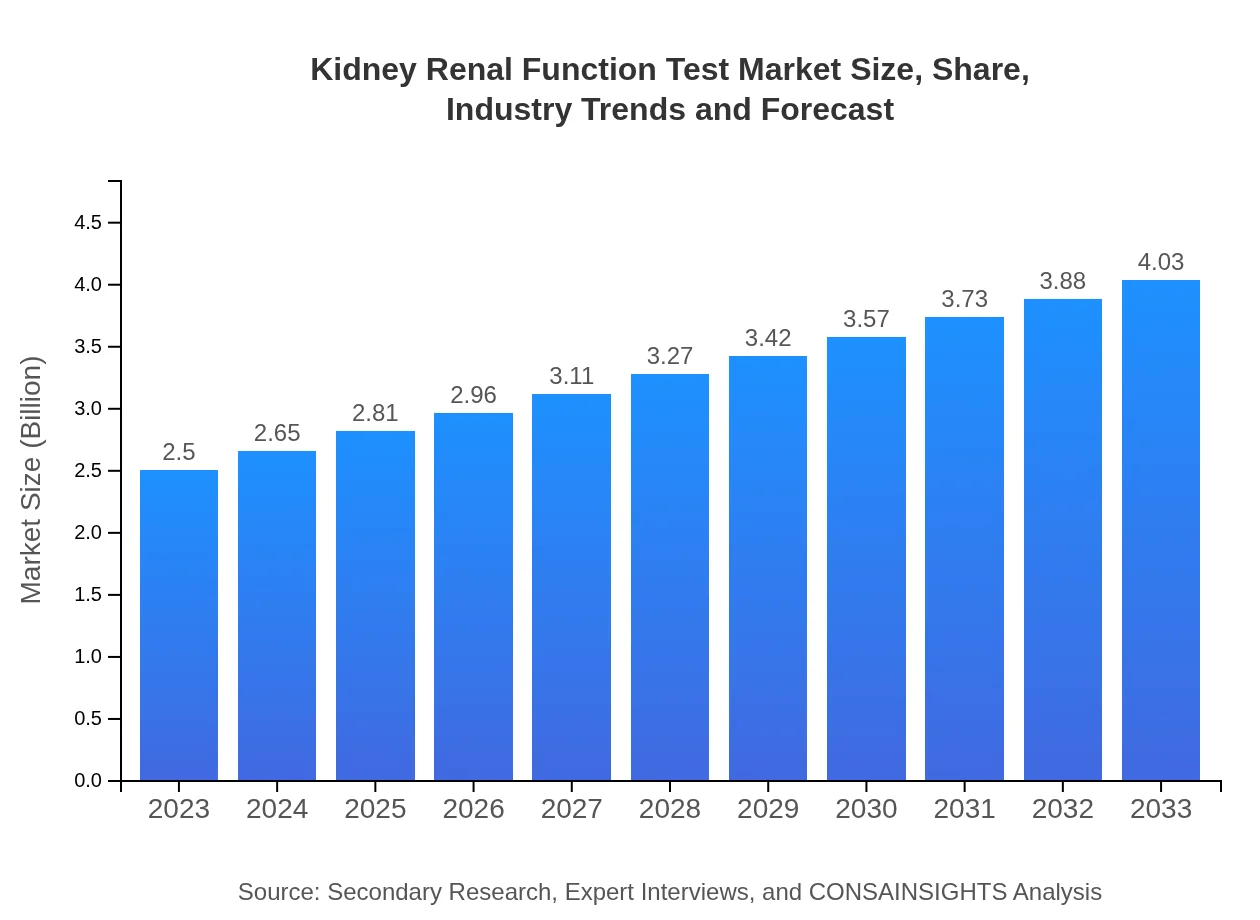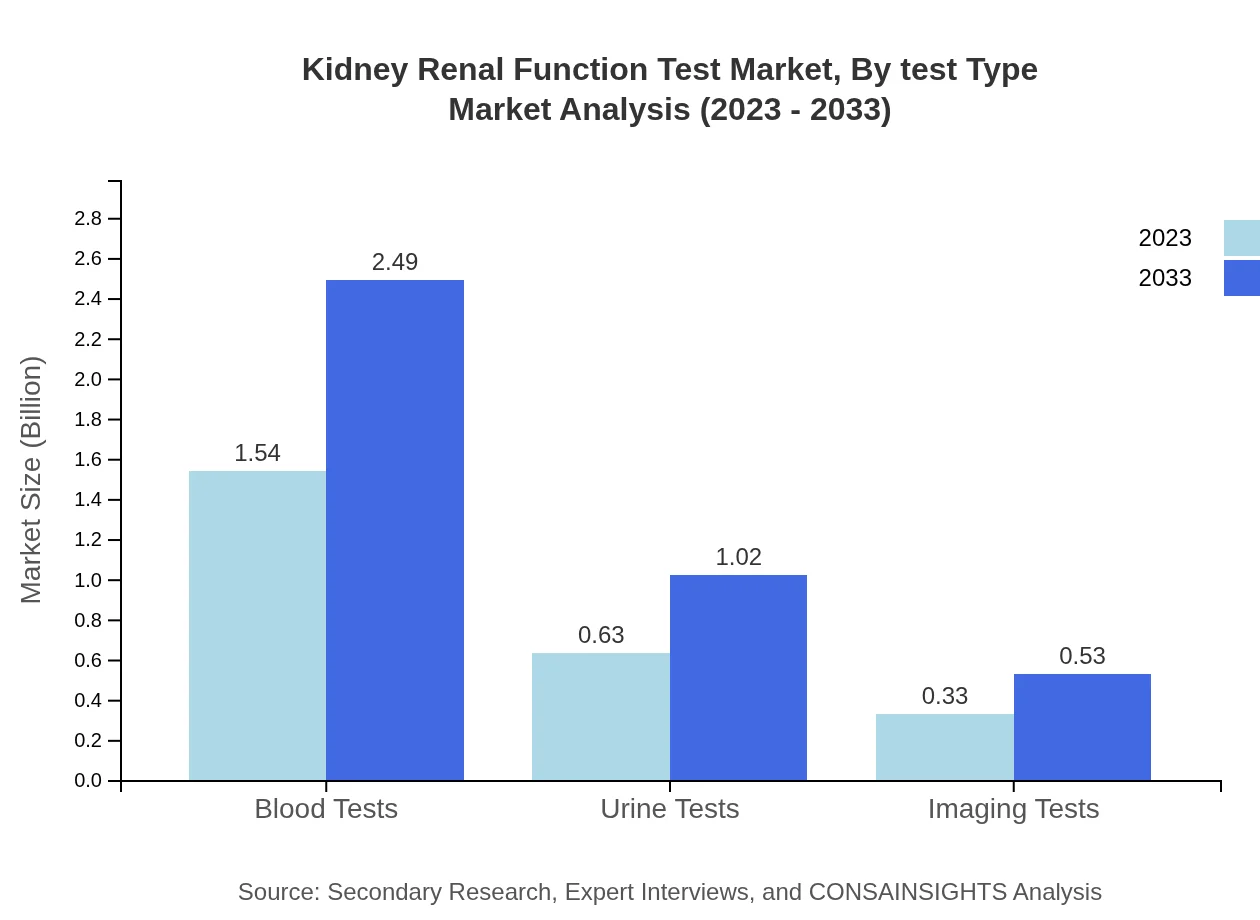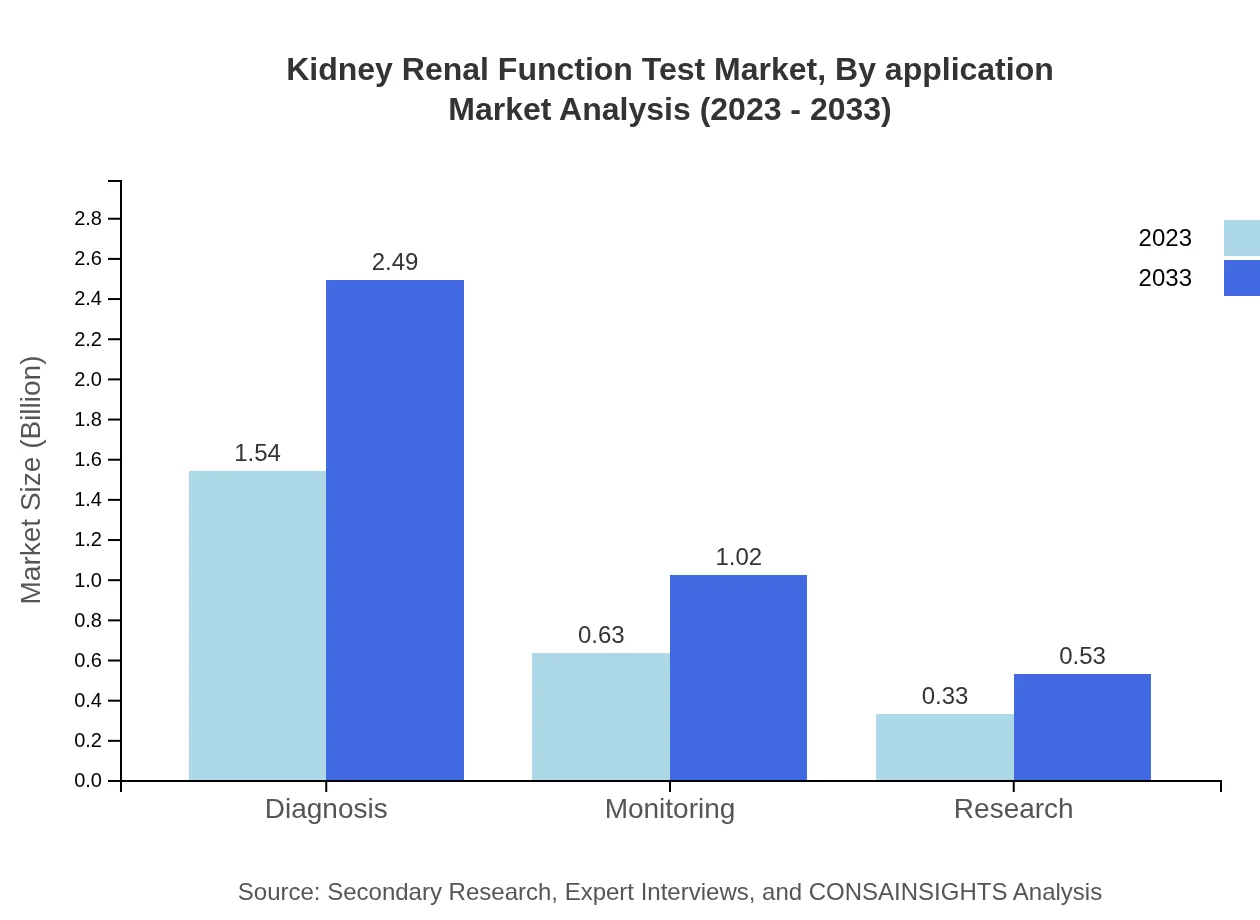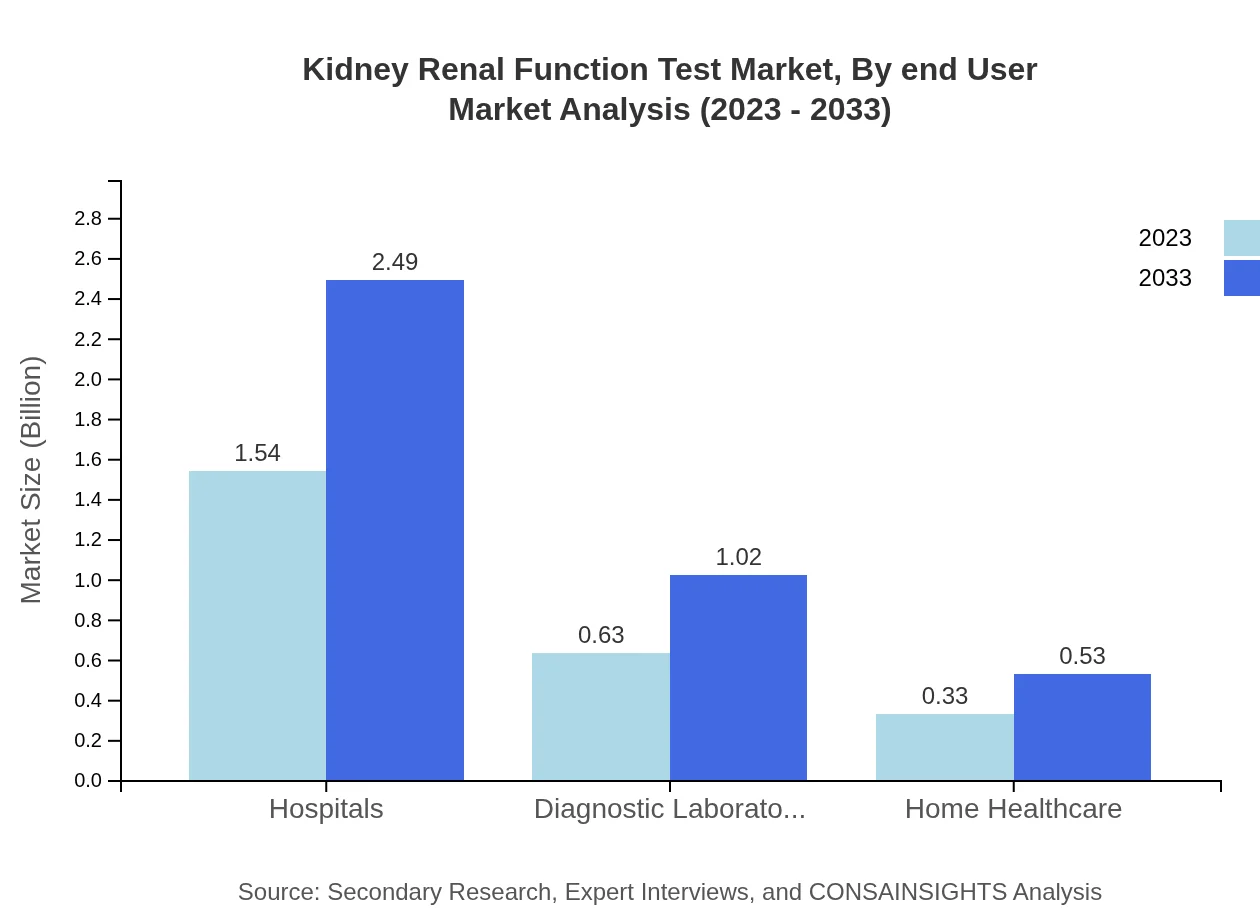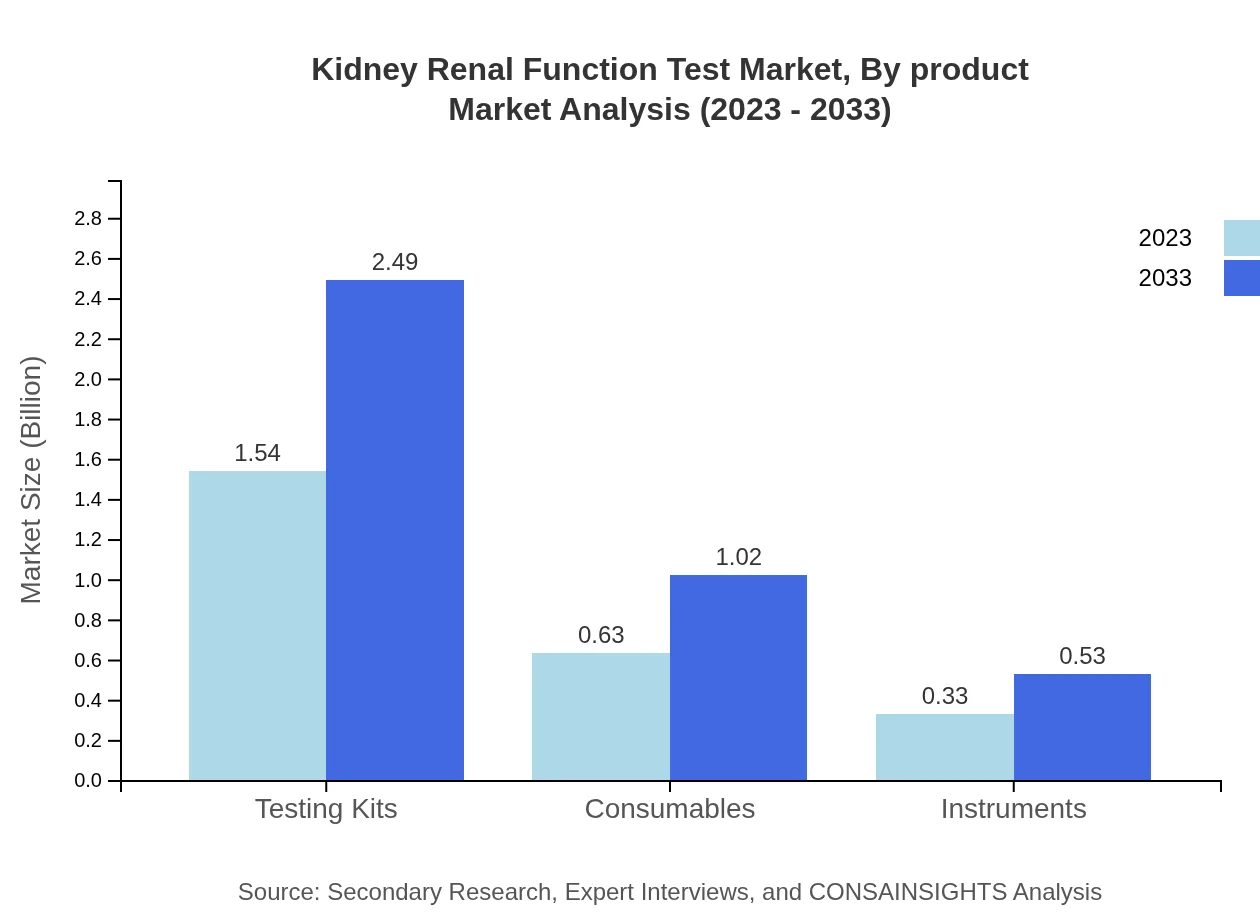Kidney Renal Function Test Market Report
Published Date: 31 January 2026 | Report Code: kidney-renal-function-test
Kidney Renal Function Test Market Size, Share, Industry Trends and Forecast to 2033
This report provides a comprehensive analysis of the Kidney Renal Function Test market from 2023 to 2033, focusing on market trends, size, growth prospects, regional breakdown, and key players. It aims to deliver critical insights into the industry landscape and future outlook.
| Metric | Value |
|---|---|
| Study Period | 2023 - 2033 |
| 2023 Market Size | $2.50 Billion |
| CAGR (2023-2033) | 4.8% |
| 2033 Market Size | $4.03 Billion |
| Top Companies | Abbott Laboratories, Roche Diagnostics, Siemens Healthineers, Thermo Fisher Scientific, F. Hoffmann-La Roche AG |
| Last Modified Date | 31 January 2026 |
Kidney Renal Function Test Market Overview
Customize Kidney Renal Function Test Market Report market research report
- ✔ Get in-depth analysis of Kidney Renal Function Test market size, growth, and forecasts.
- ✔ Understand Kidney Renal Function Test's regional dynamics and industry-specific trends.
- ✔ Identify potential applications, end-user demand, and growth segments in Kidney Renal Function Test
What is the Market Size & CAGR of Kidney Renal Function Test market in 2023?
Kidney Renal Function Test Industry Analysis
Kidney Renal Function Test Market Segmentation and Scope
Tell us your focus area and get a customized research report.
Kidney Renal Function Test Market Analysis Report by Region
Europe Kidney Renal Function Test Market Report:
In Europe, the market for Kidney Renal Function Tests is anticipated to escalate from $0.81 billion in 2023 to $1.31 billion by 2033. Factors such as rising healthcare expenditures, technological advancements, and the aging population in countries like Germany, France, and the UK are key contributors to the market's expansion.Asia Pacific Kidney Renal Function Test Market Report:
In the Asia Pacific region, the Kidney Renal Function Test market is projected to grow from $0.43 billion in 2023 to $0.70 billion by 2033. The growth is fueled by increasing healthcare investments, a larger elderly population, and heightened awareness of kidney health. Countries like Japan and China are focusing on enhancing their healthcare infrastructure, which is anticipated to spur demand for renal testing.North America Kidney Renal Function Test Market Report:
North America is projected to be the largest market, growing from $0.90 billion in 2023 to $1.46 billion by 2033. The high prevalence of renal disorders, advanced healthcare facilities, and innovative technologies define this region. Increased health consciousness among the population also contributes to the growth of Kidney Renal Function Tests in North America.South America Kidney Renal Function Test Market Report:
The South American market for Kidney Renal Function Tests is expected to increase from $0.16 billion in 2023 to $0.26 billion in 2033. This growth is driven by the rising prevalence of chronic kidney diseases and government initiatives aimed at improving healthcare access. Countries like Brazil and Argentina are making strides in healthcare spending, which supports market growth.Middle East & Africa Kidney Renal Function Test Market Report:
The Middle East and Africa region is projected to experience growth from $0.19 billion in 2023 to $0.31 billion by 2033. Growth drivers include increasing awareness of kidney health, improving healthcare infrastructures, and a rise in the prevalence of renal diseases in the region's rapidly urbanizing population.Tell us your focus area and get a customized research report.
Kidney Renal Function Test Market Analysis By Test Type
The Kidney Renal Function Test market, segmented by test type, includes testing kits, consumables, and instruments. In 2023, testing kits dominate the market with a size of $1.54 billion and a share of 61.74%. By 2033, the market size for testing kits is expected to grow to $2.49 billion, maintaining the same share. Consumables and instruments also play significant roles, with consumables projected to increase from $0.63 billion in 2023 to $1.02 billion by 2033.
Kidney Renal Function Test Market Analysis By Application
In terms of applications, the Kidney Renal Function Test market consists of diagnosis, monitoring, and research. Diagnosis applications lead the market, projected at a size of $1.54 billion in 2023 and expected to grow to $2.49 billion by 2033. Monitoring applications are also significant, with a size of $0.63 billion in 2023 projected to increase to $1.02 billion by 2033, showcasing the growing need for continuous renal health assessment.
Kidney Renal Function Test Market Analysis By End User
In terms of end-users, the Kidney Renal Function Test market comprises hospitals, diagnostic laboratories, and home healthcare. Hospitals represent the largest segment, amounting to $1.54 billion in size in 2023, with an anticipated growth to $2.49 billion by 2033. Diagnostic laboratories also hold a significant presence, starting at $0.63 billion in 2023 and projected to reach $1.02 billion by 2033.
Kidney Renal Function Test Market Analysis By Product
The product type segment of the Kidney Renal Function Test market includes testing kits, consumables, and instruments. Testing kits lead with a projected size of $1.54 billion in 2023, maintaining significant growth to $2.49 billion by 2033. The contribution of consumables and instruments is also notable, supporting the overall function and efficiency of renal testing procedures.
Kidney Renal Function Test Market Trends and Future Forecast
Tell us your focus area and get a customized research report.
Global Market Leaders and Top Companies in Kidney Renal Function Test Industry
Abbott Laboratories:
Abbott Laboratories is a major player in the healthcare industry known for its innovative diagnostic solutions, including tests for renal function. The company focuses on research and development, aiming to enhance diagnostic accuracy and efficiency.Roche Diagnostics:
Roche Diagnostics is renowned for its advanced medical technologies and diagnostic tools. They provide a wide range of renal function tests and are committed to innovation, ensuring comprehensive solutions for renal health.Siemens Healthineers:
Siemens Healthineers offers a broad portfolio of medical technologies, including diagnostic imaging and laboratory diagnostics. Their contributions to renal testing significantly enhance patient outcomes with advanced testing capabilities.Thermo Fisher Scientific:
Thermo Fisher Scientific specializes in serving mission-critical diagnostic testing needs. The company's renal function testing products are integral to managing kidney diseases effectively.F. Hoffmann-La Roche AG:
F. Hoffmann-La Roche AG is a leading global health company that produces a wide range of diagnostic tests, including those for kidney function. They are focused on meeting the healthcare needs of patients through innovation.We're grateful to work with incredible clients.









FAQs
What is the market size of kidney Renal Function Test?
The kidney-renal-function-test market is currently valued at approximately $2.5 billion, with a projected growth rate (CAGR) of 4.8% from 2023 to 2033. This indicates significant potential for expansion over the next decade.
What are the key market players or companies in this kidney Renal Function Test industry?
Key market players in the kidney-renal-function-test industry include leading diagnostic companies, laboratory equipment manufacturers, and healthcare providers. They play a critical role in advancing technology, improving testing accuracy, and enhancing patient care in renal health.
What are the primary factors driving the growth in the kidney Renal Function Test industry?
Growth in the kidney-renal-function-test industry is driven by increasing prevalence of kidney diseases, advancements in diagnostic technologies, a greater focus on preventive healthcare, and rising awareness regarding the importance of renal function monitoring.
Which region is the fastest Growing in the kidney Renal Function Test?
The North America region is the fastest-growing market for kidney-renal-function-tests. Projected growth indicates a market expansion from $0.90 billion in 2023 to $1.46 billion by 2033, driven by advanced healthcare infrastructure and increasing testing demand.
Does ConsaInsights provide customized market report data for the kidney Renal Function Test industry?
Yes, ConsaInsights offers customized market report data specifically tailored to the kidney-renal-function-test industry. Clients can seek reports that align with their business needs, market segments, and geographical focus for better decision-making.
What deliverables can I expect from this kidney Renal Function Test market research project?
From the kidney-renal-function-test market research project, clients can expect detailed market size analysis, growth projections, competitive landscape insights, key drivers and trends, along with regional segment breakdown and strategic recommendations.
What are the market trends of kidney Renal Function Test?
Market trends in the kidney-renal-function-test sector include increased adoption of advanced testing kits, growth in home healthcare testing, and shifting focus towards preventative diagnostics, designed to enhance patient outcomes and facilitate early disease detection.

